
Preventive Care
Click the links to find out more:
Preventive dental care is important throughout your life, no matter your age.
Preventive care (including x-rays, hygiene visits and exams) is extremely important for your overall oral health and also the most beneficial way to save yourself from costly treatment.
By practicing good oral hygiene at home and scheduling regular checkups with your dentist, you can help keep your smile bright and healthy for many years to come. Here are a few simple ways that you can prevent the build-up of plaque and cavities:
Brush your teeth at least twice a day with a soft-bristled toothbrush.
Use fluoride toothpaste to remove food particles and plaque from the tooth surfaces. Also be sure to brush the top surface of your tongue; this will remove any extra plaque-causing food particles, and help keep your breath fresh!
Clean between your teeth by flossing at least once a day. You can also use a mouthwash to help kill bacteria and freshen your breath. Decay-causing bacteria can linger between teeth where toothbrush bristles can't reach. Floss and mouthwash will help remove plaque and food particles from between the teeth and under the gum line.
Eat a balanced diet, and try to avoid extra-sugary treats. Nutritious foods such as raw vegetables, plain yogurt, cheese, or fruit can help keep your smile healthy.
Remember to schedule regular checkups with your dentist every six months for a professional teeth cleaning.
Ask your dentist about dental sealants, protective plastic coatings that can be applied to the chewing surfaces of the back teeth where decay often starts.
If you play sports, be sure to ask your dentist about special mouthguards designed to protect your smile.
If you often wake up with jaw pain, earaches, or headaches, or if you find yourself clenching or grinding your teeth, you may need a nightguard.
If it's been six months since your last dental checkup, then it's time to contact our practice and schedule your next appointment!
Brushing & Flossing Instructions

Step 1
Place your toothbrush at a 45-degree angle to your gum.
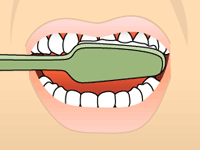
Step 2
Brush gently in a circular motion.
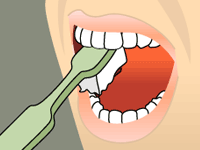
Step 3
Brush the outer, inner, and chewing surfaces of each tooth.

Step 4
Use the tip of your brush for the inner surface of your front teeth.
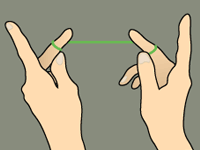
Step 1
Wind about 18 inches of floss around your fingers as shown. Most of it should be wrapped around one finger, and the other finger takes it up as the floss is used.
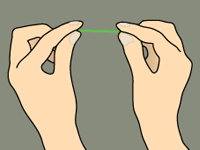
Step 2
Use your thumbs and forefingers to guide about one inch of floss between your teeth.
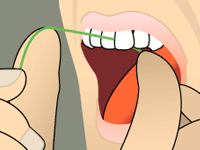
Step 3
Holding the floss tightly, gently saw it between your teeth. Then curve the floss into a C-shape against one tooth and gently slide it beneath your gums.
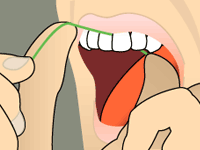
Step 4
Slide the floss up and down, repeating for each tooth.
Exams & Hygiene
Regular exams are an important part of maintaining your oral health. During your regular exam, we will:
-
Check for any problems that you may not see or feel
-
Look for cavities or any other signs of tooth decay
-
Inspect your teeth and gums for gingivitis and signs of periodontal disease
-
Perform a thorough teeth cleaning
Your regular exam will take about 1 hour. Each regular exam includes a detailed teeth cleaning in which we will clean, polish, and rinse your teeth to remove any tartar and plaque that have built up on the teeth surfaces.
Visiting our office every six months gives you the chance to talk to the doctor about any questions you may have about your oral health. Regular exams are offered by appointment only, so please contact our practice today to schedule your next dental exam and teeth cleaning.


Fluoride
Fluoride is effective in preventing cavities and tooth decay and in preventing plaque from building up and hardening on the tooth’s surface. A fluoride treatment in your dentist’s office takes just a few minutes.
After the treatment, patients may be asked not to rinse, eat, or drink for at least 30 minutes in order to allow the teeth to absorb the fluoride.
Depending on your oral health or your doctor’s recommendation, you may be required to have a fluoride treatment every three, six, or 12 months.

Sealants
Sometimes brushing is not enough, especially when it comes to those hard-to-reach spots in your mouth. It is difficult for your toothbrush to get in-between the small cracks and grooves on your teeth. If left alone, those tiny areas can develop tooth decay. Sealants give your teeth extra protection against decay and help prevent cavities.
Dental sealants are plastic resins that bond and harden in the deep grooves on your tooth’s surface. When a tooth is sealed, the tiny grooves become smooth and are less likely to harbor plaque. With sealants, brushing your teeth becomes easier and more effective against tooth decay.
Sealants are typically applied to children’s teeth as a preventive measure against tooth decay after the permanent teeth have erupted. However, adults can also receive sealants on healthy teeth. It is more common to seal “permanent” teeth rather than “baby” teeth, but every patient has unique needs, and your dentist will recommend sealants on a case-by-case basis.
Sealants last from three to five years, but it is fairly common to see adults with sealants still intact from their childhood. A dental sealant only provides protection when it is fully intact, so if your sealants come off, let your dentist know, and schedule an appointment for your teeth to be re-sealed.

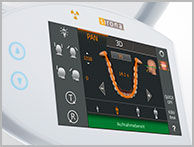
Digital X-Rays
Using the most advanced dental technology possible is just as important as staying up-to-date on the latest treatment techniques. Because our practice is dedicated to providing you with the safest and most convenient treatment options available, we utilize advanced digital X-ray technology in our office.
Digital X-rays provide several advanced imaging options designed to save time, provide clearer dental photos, and expose patients to less radiation than traditional X-ray technology. Our X-ray technology also includes CBCT imaging.
Cone Beam Computed Tomography (CBCT) technology is quickly becoming the standard of care when it comes to dental imaging. Our office is committed to providing the highest quality of dental care, and we are proud to introduce the Sirona 3D CBCT Scanner into our practice. When it comes to your dental needs, the 3D CBCT Scanner allows us to plan all aspects of your care with precision and accuracy.
Quick–Comfortable–Effective
-
CBCT images are highly detailed, showing both soft and hard tissue without sacrificing clarity.
-
CBCT Scanners take less than a minute, are completely painless, and the radiation dose is 100 times less than a traditional CT scanner.
-
We can analyze the position and orientation of critical structures, like nerves, teeth roots, the sinus, and nose, helping to make your diagnosis as accurate as possible.
-
With this advanced imaging technology, we are able to ensure the long-term stability of your dental restorations better than ever before.
-
We can focus on your desired aesthetic outcome throughout your entire treatment process.
Our practice is focused on making your dental experience as comfortable as possible. At your next appointment, we'll be happy to answer any questions you may have.

Mouthguards
Whether you wear braces or not, protecting your smile while playing sports is essential. Mouthguards help protect your teeth and gums from injury. If you participate in any kind of full-contact sport, the American Dental Association recommends that you wear a mouthguard.
Choosing the right mouthguard is essential. There are three basic types of mouthguards: the pre-made mouthguard, the “boil-and-bite” fitted mouthguard, and a custom-made mouthguard from your dentist. When you choose a mouthguard, be sure to pick one that is tear-resistant, comfortable and well-fitted for your mouth, easy to keep clean, and does not prevent you from breathing properly.
Your dentist can show you how to wear a mouthguard properly and how to choose the right mouthguard to protect your smile.
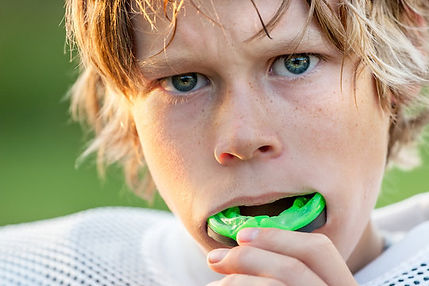
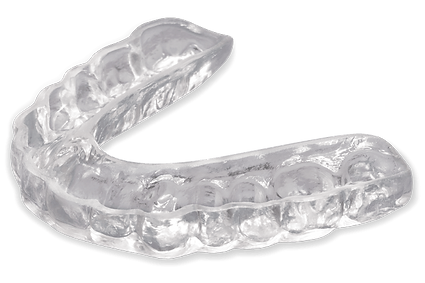
Nightguards
If you often wake up with jaw pain, earaches, or headaches, or if you find yourself clenching or grinding your teeth, you may have a common condition called “bruxism.” Many people do not even know that they grind their teeth, as it often occurs when one is sleeping. If not corrected, bruxism can lead to broken teeth, cracked teeth, or even tooth loss.
There is an easy, non-invasive treatment for bruxism: nightguards. Nightguards are an easy way to prevent the wear and damage that teeth-grinding causes over time. Custom-made by your dentist from soft material to fit your teeth, a nightguard is inserted over your top or bottom arch and prevents contact with the opposing teeth.
Snore Guards (EMA and TAP)
While snoring is a common problem for many people, it can also be a sign of other major health complications. It is estimated that more than 80 million people in North America snore while sleeping, which not only affects the quality of sleep of the person snoring, but also the quality of sleep of their loved ones and other family members. Luckily, there is a way to treat chronic snoring.
What causes snoring?
Snoring can be the result of several factors. Typically, snoring is caused by the relaxing of the muscles and soft tissues in the throat and mouth, making the air passage smaller. The decrease in space through the airway makes it harder for each breath to get through, and when it does get through, it moves over the soft tissues in the mouth and throat and causes a vibration that results in the snoring sound.
Other causes of snoring may include:
-
Excess body weight
-
Alcohol consumption
-
Certain sleep aides or sedatives
-
Obstructive Sleep Apnea (OSA)

What is an EMA Device?
The EMA (Elastic Mandibular Advancement) oral appliance is a customized removable appliance created for the noninvasive treatment of snoring and obstructive sleep apnea (OSA). The appliance is designed to both advance the mandible and open the bite to allow for less restricted airflow during sleep.
EMA devices help promote a deeper, more restful sleep by preventing snoring and relieving the symptoms of OSA. The EMA does not interfere with breathing through the mouth, even in cases of congested nasal passages. It has many options for advancement with nine strap lengths (13 mm–21 mm) and four different elastic tension options, indicated by color. The shorter the strap, the farther the mandible is advanced. The 36 different straps allow for the most effective repositioning of the jaw with maximum comfort. Due to the varying elastic bands, non-restricted lateral/protrusive movement is possible while wearing the device.

What is a TAP Device?
If you snore at night, then a Thornton Adjustable Positioner (TAP) may represent a solution and a better night's sleep! The TAP device is a specially designed dental device that gently helps keep the lower jaw, or mandible, in a forward position, increasing the space between the airway passage and helping you breathe better so you can get a full, quiet night's sleep.
Some devices also stop the tongue from falling back over your windpipe. Your dentist will fit these special appliances to meet your individual condition.
Is a TAP device comfortable?
The answer is simple — YES! A TAP device is made to be comfortable, so that you can sleep without even noticing you're wearing it. It does not prevent you from breathing with your mouth open and will even eliminate snoring for patients with sinus congestion or allergies. You may experience some slight stiffness of the jaw for the first few mornings after wearing the device, but this feeling is only temporary, and will go away after you wake up and remove the device.
To learn more about a mandibular advancement device, contact our practice and schedule an appointment and consultation.


